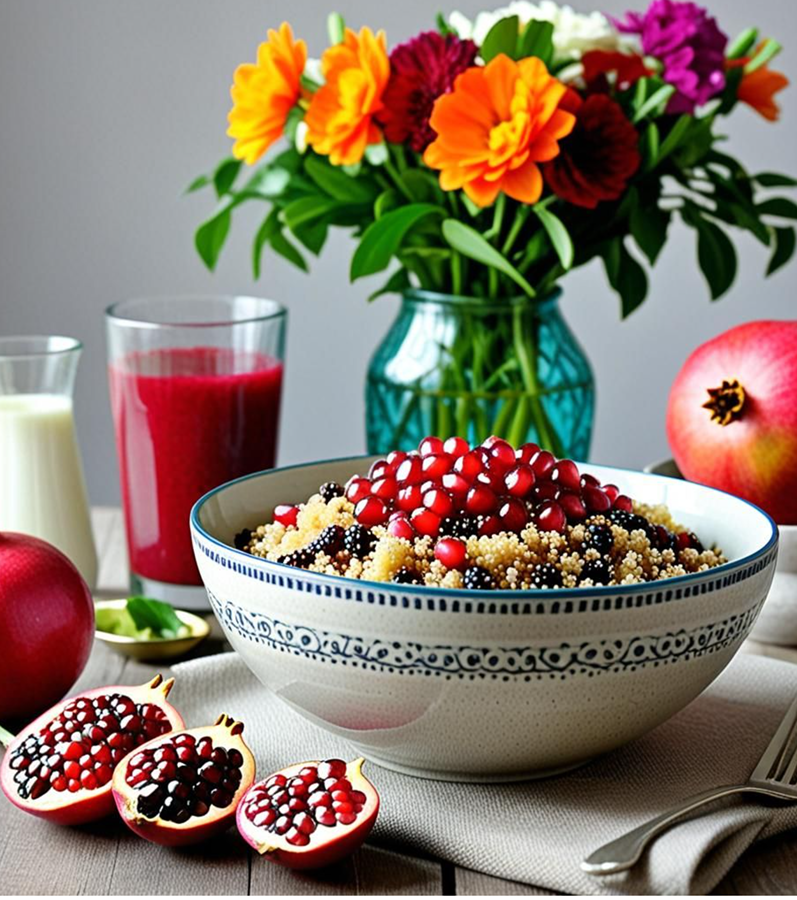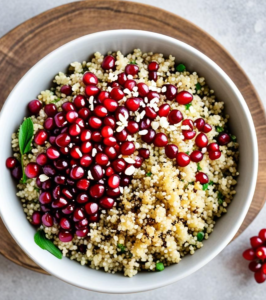Pomegranate Quinoa Bowl: Antioxidant Powerhouse

Pomegranate Quinoa Salad
Pomegranate Quinoa Bowl
Ingredients
- Ingredients
- 1 cup quinoa, rinsed
- 2 cups water or vegetable broth
- 1 cup pomegranate seeds
- 1 small cucumber, diced
- 1 cup canned chickpeas, drained and rinsed
- 1/4 cup fresh mint leaves, chopped
- 1/4 cup fresh parsley leaves, chopped
- 1/2 cup Vegan-crumbled feta cheese optional
- 1/4 cup toasted almonds
- 1/4 cup pomegranate arils (for garnish)
Dressing
- 3 tbsp olive oil
- 2 tbsp lemon juice (juice of one lemon)
- 1 tbsp apple cider vinegar
- 1 tbsp maple syrup
- salt & pepper to taste
Instructions
- Instructions
- Cook the quinoa-in medium saucepan, bring the vegetable broth to a boiladd in rinsed quinoa, reduce heat to low, cover an dsimmer for 15 minutes or until quinoa is tender and all liquid is absorbed
- Remove quinoa from heat and let sit for 5 minutes. Fluff with fork and let it cool.
- Prepare the dressing: In a small bowl, whisk together the olive oil, lemon juice, vinegar, maple syrup, salt & pepper.
- In a large bowl, combine the cooked quinoa, pomegranate seeds, diced cucumber, chickpeas, chopped mint and parsley.
- Pour dressing over the quinoa mixture and toss gently to combine.
- Top with feta cheese (optional)

A pomegranate quinoa salad is a refreshing and nutrient-packed dish that can be enjoyed as a main course or side dish. Combine cooked quinoa with fresh pomegranate seeds, diced cucumber, chopped mint, and a light lemon vinaigrette. This salad is not only visually appealing but also provides a perfect balance of flavors and textures.
The Health Benefits of Pomegranates and Quinoa: A Nutritional Powerhouse
In the realm of superfoods, few combinations rival the nutritional benefits and versatility of pomegranates and quinoa. These two ingredients not only complement each other in culinary creations but also offer a myriad of health benefits that can enhance overall well-being. This blog post delves into the profound health advantages of incorporating pomegranates and quinoa into your diet, exploring their nutritional profiles, potential health benefits, and practical ways to enjoy them in your daily meals.
The Nutritional Power of Pomegranates
Pomegranates, with their jewel-like seeds and sweet-tart flavor, have been celebrated for centuries as a symbol of health and fertility. Modern science has confirmed that this ancient fruit is indeed a nutritional powerhouse, packed with essential vitamins, minerals, and antioxidants.
1. Rich in Antioxidants
Pomegranates are renowned for their high antioxidant content, particularly punicalagins and anthocyanins. These antioxidants help combat oxidative stress, reducing the risk of chronic diseases such as heart disease, cancer, and diabetes. The polyphenols in pomegranates also play a crucial role in neutralizing free radicals, thereby protecting cells from damage.
2. Heart Health
Regular consumption of pomegranates has been linked to improved heart health. The antioxidants in pomegranates can help lower blood pressure, reduce inflammation, and improve cholesterol levels. Studies have shown that pomegranate juice can significantly reduce systolic blood pressure, a key factor in preventing heart disease.
3. Anti-Inflammatory Properties
Chronic inflammation is a major contributor to many diseases, including heart disease, cancer, and Alzheimer’s. Pomegranates possess potent anti-inflammatory properties due to their high concentration of antioxidants. These properties can help reduce inflammation in the body, potentially lowering the risk of chronic diseases.
4. Cancer Prevention
Research suggests that pomegranates may have anti-cancer properties. The antioxidants in pomegranates, particularly punicalagins and ellagic acid, have been shown to inhibit the growth of cancer cells and reduce the risk of certain cancers, including breast and prostate cancer. Pomegranate extract has also been found to induce apoptosis (programmed cell death) in cancer cells.
5. Digestive Health
Pomegranates are a good source of dietary fiber, which is essential for healthy digestion. Fiber helps regulate bowel movements, prevent constipation, and support a healthy gut microbiome. Additionally, pomegranate juice has been shown to have anti-inflammatory effects on the digestive tract, potentially reducing symptoms of inflammatory bowel diseases like Crohn’s disease and ulcerative colitis.
6. Skin Health
The antioxidants in pomegranates can also benefit the skin by protecting it from damage caused by UV radiation and environmental pollutants. Pomegranate extract has been shown to promote collagen production, improving skin elasticity and reducing the appearance of wrinkles. Additionally, the anti-inflammatory properties of pomegranates can help soothe skin conditions such as acne and eczema.
7. Improved Memory and Brain Health
Emerging research suggests that pomegranates may have cognitive benefits. The antioxidants in pomegranates can help reduce oxidative stress and inflammation in the brain, potentially improving memory and cognitive function. Studies have shown that pomegranate juice consumption is associated with improved memory in older adults and may help slow the progression of Alzheimer’s disease.
The Nutritional Power of Quinoa
Quinoa, often referred to as a “super grain,” is a nutrient-dense seed that has been cultivated for thousands of years in the Andean region of South America. It is a complete protein, meaning it contains all nine essential amino acids, making it an excellent protein source for vegetarians and vegans. Additionally, quinoa is gluten-free and packed with vitamins, minerals, and antioxidants.
1. Complete Protein Source
One of the most notable benefits of quinoa is its status as a complete protein. This means that it provides all nine essential amino acids that the body cannot produce on its own. This makes quinoa an excellent protein source for vegetarians, vegans, and anyone looking to diversify their protein intake. A single cup of cooked quinoa provides about 8 grams of protein.
2. High in Fiber
Quinoa is an excellent source of dietary fiber, with about 5 grams of fiber per cooked cup. Fiber is crucial for maintaining healthy digestion, regulating blood sugar levels, and reducing the risk of chronic diseases such as heart disease and type 2 diabetes. The high fiber content in quinoa can also promote feelings of fullness, aiding in weight management.
3. Rich in Essential Nutrients
Quinoa is packed with essential vitamins and minerals, including magnesium, phosphorus, manganese, and folate. Magnesium is important for muscle and nerve function, while phosphorus supports healthy bones and teeth. Manganese is a powerful antioxidant that helps protect cells from damage, and folate is crucial for DNA synthesis and repair.
4. Antioxidant Properties
Like pomegranates, quinoa is rich in antioxidants, including quercetin and kaempferol. These antioxidants help protect cells from oxidative stress and reduce inflammation, potentially lowering the risk of chronic diseases. The antioxidant properties of quinoa can also support overall health and well-being.
5. Heart Health
The high fiber and antioxidant content in quinoa can contribute to improved heart health. Fiber helps reduce cholesterol levels, while antioxidants protect against oxidative damage and inflammation. Additionally, quinoa’s magnesium content can help regulate blood pressure, further supporting cardiovascular health.
6. Blood Sugar Regulation
Quinoa has a low glycemic index, meaning it does not cause rapid spikes in blood sugar levels. This makes it a suitable food for individuals with diabetes or those looking to manage their blood sugar levels. The fiber and protein content in quinoa also contribute to its blood sugar-regulating properties by slowing the absorption of glucose into the bloodstream.
7. Weight Management
Incorporating quinoa into your diet can support weight management efforts. The high fiber and protein content of quinoa can promote feelings of fullness and reduce overall calorie intake. Additionally, quinoa is a nutrient-dense food, providing essential vitamins and minerals without adding excessive calories.
Combining Pomegranates and Quinoa: A Nutritional Symphony
Combining pomegranates and quinoa in your meals can amplify the health benefits of each ingredient, creating a delicious and nutritious culinary experience. Here are a few creative ways to enjoy this powerful combination:
You may also like these healthy salad ideas:
